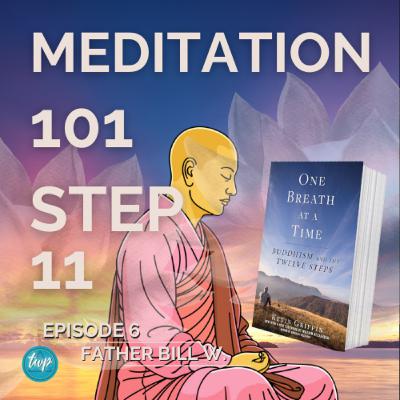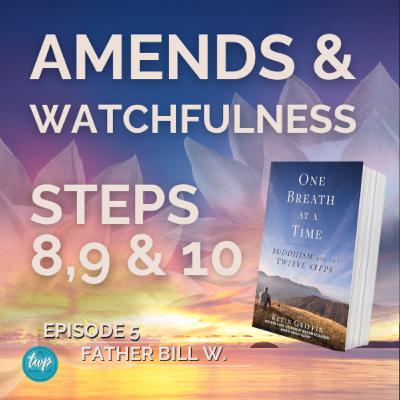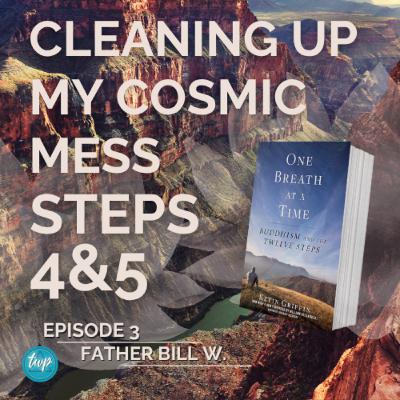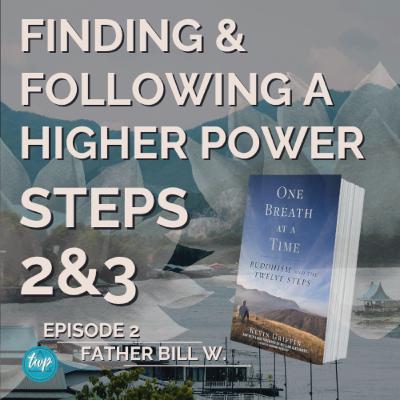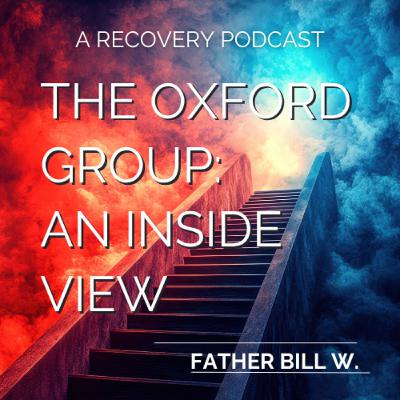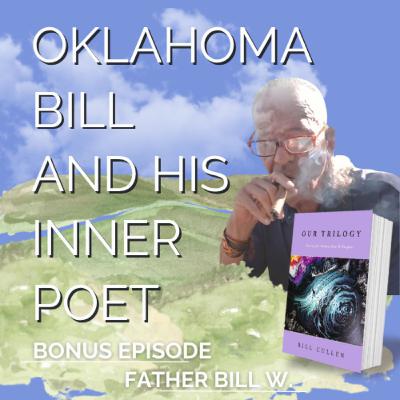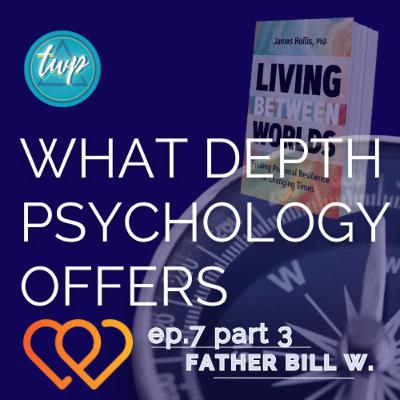Discover Father Bill W.
Father Bill W.

Father Bill W.
Author: Father Bill W.
Subscribed: 160Played: 8,154Subscribe
Share
© Father Bill W.
Description
I’m an Episcopal (Anglican) priest in recovery from alcoholism since 1972. I've spent my career in addiction treatment focused on 12-Step spirituality and exploring the pioneer history of AA. In discovering the lost 11th Step practice of Two Way Prayer, my program underwent a life-changing transformation. As Bill Wilson said, “ something was lost from AA when we stopped emphasizing the morning meditation." My mission now is helping people in 12-Step Fellowships explore a deeper understanding of spiritual practice and how it connects us to the "Great Reality" within. -Fr. Bill W.
295 Episodes
Reverse
Why do alcoholics and drug addicts find it so hard to quit and stay quit? Is addiction really a disease? And if it is, how’s it best treated?It’s been over a hundred years since Dr. William Silkworth formulated his “allergy theory” that appeared in the Big Book. Since then, science has learned a whole lot more about both the physical and psychological dimensions underlying addiction. In this episode Fr. Bill interviews addictionologist Doctor Nicole T. Labor, DO, author of The Addictoholic Deconstructed. Her book provides the general reader and those in recovery with a much-needed primer on the brain chemistry that underlies addiction. Dr. Labor shares her story of recovery and her passion for helping both addicts and family members recover. You’ll find her knowledgeable, dedicated, and pretty damned funny. Her book is available in the show notes below. Show notes:The Addictoholic Deconstructed by Nicole T. Labor, DO, BCFP,BCABAM, FASAMDr. Labor’s website and contact information: https://www.theaddictsdoc.com/
When setting off on any journey, it’s best to know your intended destination in advance. On the 12th Step journey, to use the Big Book’s original wording, that means following the 12 Steps to arrive at a transformational spiritual experience - one powerful enough to overcome addiction. Of course, the wording of the 12th Step was soon changed to “a spiritual awakening” not wanting to scare newcomers away. But when Bill Wilson tried changing it back to the original, AA wouldn’t let him.This single episode describes the “psychic change” the Steps are intended to bring about using three quotes to describe the experience. First, a definition that originated with William James in his Varieties of Religious Experience; second, the description contained in the Big Book; and finally, a helpful quote from Jungian author Robert A. Johnson’s book Transformation. These quotes are contained in a handout found in the show notes.Show notes: What Is a Psychic Change or Spiritual ExperienceQuantum Change by Professor William MillerTransformation by Robert A. JohnsonJung’s Answer to Job https://en.wikipedia.org/wiki/Answer_to_Job
David Belden was born into a family of Oxford Group leaders and committed activists. The Group set out “to change the world” and throughout his early years David devoted himself wholeheartedly to this challenge. But while “carrying the message” in Africa, his life took an unexpected turn that led to his questioning some of principles and practices he had once taken uncritically for granted.David returned to Oxford University to write his doctoral dissertation on the Group’s history, influence and shortcomings. He recently published a still more intimate account of his own journey toward personal and social transformation and change: The World Remakers’ Child.This series affords a rare insider’s view of the Group responsible for contributing no fewer than ten of A.A.’s Twelve Steps and yields fresh insights and challenges throughout. Mahatma Gandhi’s grandson praised David’s book for its “steady candor,” “humor about himself,” and “a thirst for a less harsh, more loving, and fairer world.”The first episode briefly introduces David’s story to listeners after which he and Fr. Bill explore the life of Oxford Group founder Frank Buchman. Show notes:David Belden’s book: The World Remakers’ ChildDave’s Oxford University Doctoral Thesis:https://www.academia.edu/27545723/The_Origins_and_Development_of_the_Oxford_Group_Moral_Re_Armament_For Sinners Only by A.J. Russell (used books are getting expensive. This is the cheapest I found)
David Belden was born into a family of Oxford Group leaders and committed activists. The Group set out “to change the world” and throughout his early years David devoted himself wholeheartedly to this challenge. But while “carrying the message” in Africa, his life took an unexpected turn that led to his questioning some of principles and practices he had once taken uncritically for granted.David returned to Oxford University to write his doctoral dissertation on the Group’s history, influence and shortcomings. He recently published a still more intimate account of his own journey toward personal and social transformation and change: The World Remakers’ Child.This series affords a rare insider’s view of the Group responsible for contributing no fewer than ten of A.A.’s Twelve Steps and yields fresh insights and challenges throughout. Mahatma Gandhi’s grandson praised David’s book for its “steady candor,” “humor about himself,” and “a thirst for a less harsh, more loving, and fairer world.”In this final episode Dave’s early Oxford Group goal of “world changing” may have traveled full circle. It’s reminiscent of the poet T.S Elliott’s famous lines:We shall not cease from exploration And the end of all our exploring Will be to arrive where we started And know the place for the first time.Show notes:David Belden’s book: The World Remakers’ ChildDave’s Oxford University Doctoral Thesis:https://www.academia.edu/27545723/The_Origins_and_Development_of_the_Oxford_Group_Moral_Re_Armament_Dave’s website: https://www.davidbelden.com/Dave doing a recent book reading at his Unitarian Universalist Church:https://mail.google.com/mail/u/0/?tab=wm#inbox/QgrcJHsHpqWKvMChSdmxXjJNlDCGCJGCgHL?projector=1This Is an Uprising: How Nonviolent Revolt Is Shaping the Twenty-First Century by Paul and Mark EnglerHow 12 Step Programs Can Help Build Healthier Movementshttps://wagingnonviolence.org/2025/10/how-12-step-programs-can-help-build-healthier-movements/
David Belden was born into a family of Oxford Group leaders and committed activists. The Group set out “to change the world” and throughout his early years David devoted himself wholeheartedly to this challenge. But while “carrying the message” in Africa, his life took an unexpected turn that led to his questioning some of principles and practices he had once taken uncritically for granted.David returned to Oxford University to write his doctoral dissertation on the Group’s history, influence and shortcomings. He recently published a still more intimate account of his own journey toward personal and social transformation and change: The World Remakers’ Child.This series affords a rare insider’s view of the Group responsible for contributing no fewer than ten of A.A.’s Twelve Steps and yields fresh insights and challenges throughout. Mahatma Gandhi’s grandson praised David’s book for its “steady candor,” “humor about himself,” and “a thirst for a less harsh, more loving, and fairer world.”This third episode traces the origins of many of the 12 Steps as they were practiced among members of the Group. Remember, Bill Wison said he derived no fewer than ten of his twelve Steps straight from his experience within the Oxford Group. They had no Steps, but they were well on their way to finding the Answer!Show notes:David Belden’s book: The World Remakers’ ChildDave’s Oxford University Doctoral Thesis:https://www.academia.edu/27545723/The_Origins_and_Development_of_the_Oxford_Group_Moral_Re_Armament_
David Belden was born into a family of Oxford Group leaders and committed activists. The Group set out “to change the world” and throughout his early years David devoted himself wholeheartedly to this challenge. But while “carrying the message” in Africa, his life took an unexpected turn that led to his questioning some of principles and practices he had once taken uncritically for granted.David returned to Oxford University to write his doctoral dissertation on the Group’s history, influence and shortcomings. He recently published a still more intimate account of his own journey toward personal and social transformation and change: The World Remakers’ Child.This series affords a rare insider’s view of the Group responsible for contributing no fewer than ten of A.A.’s Twelve Steps and yields fresh insights and challenges throughout. Mahatma Gandhi’s grandson praised David’s book for its “steady candor,” “humor about himself,” and “a thirst for a less harsh, more loving, and fairer world.”This second episode takes a deep dive into Dave’s immersion in the Group, what that was like, what happened, and what it’s like now. It’s quite a ride!Show notes:David Belden’s book: The World Remakers’ ChildDave’s Oxford University Doctoral Thesis:https://www.academia.edu/27545723/The_Origins_and_Development_of_the_Oxford_Group_Moral_Re_Armament_ For Sinners Only by A.J. RussellThe Christ of the Indian Road by E. Stanley Jones (free pdf)This Is an Uprising: How Nonviolent Revolt Is Shaping the Twenty-First Century by Paul and Mark EnglerHow 12 Step Programs Can Help Build Healthier Movements
Prof. Miller's book Quantum Change: When Epiphanies and Sudden Insights Transform Ordinary Lives has been described as the most definitive work on the subject of religious experiences since William James' Varieties of Religious Experience. The latter has had a profound influence on AA and Bill Wilson’s development of the 12-Steps, and this book brings the subject into the modern era. Fr. Bill interviews Professor Miller in an audio only format.Show notes:Quantum Change: When Epiphanies and Sudden Insights Transform Ordinary Lives by Professor William R. MillerWhat AA Has to Teach the Church by Sam Shoemaker / pdf on Step Study
The word HOPE appears no fewer than 34 times in the first 164 pages of the Big Book. In recovery, it’s vital for getting us started and for keeping us going.In this two-part series, Dr. Denise Ernst, PhD joins Fr. Bill in exploring the role HOPE plays in fostering meaningful change, especially in addiction recovery. Denise earned her doctorate in psychology at the University of New Mexico under the direction of Professor William R. Miller, a pioneer developer of Motivational Interviewing. She has a strong background in addiction counseling and research. Episodes are based on Dr. Miller’s recent book: 8 Ways to Hope, Charting a Path Through Uncertain Times. Hope you enjoy!Show notes:8 Ways to Hope by William R. MillerDenise Ernst, PhD website: https://deniseernst.com/Interview with Professor Bill Miller https://www.youtube.com/watch?v=5CiQ7rVXlrQViktor Frankl Man’s Search for MeaningBill Miller’s Quantum Change
The word HOPE appears no fewer than 34 times in the first 164 pages of the Big Book. In recovery, it’s vital for getting us started and for keeping us going.In this two-part series, Dr. Denise Ernst, PhD joins Fr. Bill in exploring the role HOPE plays in fostering meaningful change, especially in addiction recovery. Denise earned her doctorate in psychology at the University of New Mexico under the direction of Professor William R. Miller, a pioneer developer of Motivational Interviewing. She has a strong background in addiction counseling and research. Episodes are based on Dr. Miller’s recent book: 8 Ways to Hope, Charting a Path Through Uncertain Times. Hope you enjoy!Show notes:8 Ways to Hope by William R. MillerDenise Ernst, PhD website: https://deniseernst.com/
Tom Lavin is a therapist, an educator, and a close friend for over fifty years. He’s dedicated both his life and his career to helping people find effective solutions to the problems that come with being human. Tom recently delivered this talk on “stress” to a group of public-service attorneys in Reno, Nevada. He believes we often try to “cope with stress” rather than seek its causes that often lie below the surface of our lives. As the Big Book reminds us, “our liquor was but a symptom.” With holidays fast approaching, I thought Tom’s message is one that can benefit us all. So, relax, listen, learn, and enjoy! Show notes:Handouts: Living a Meaningful Life – Bluebird
Few people blend the Buddhist spiritual path with the 12-Step journey as seamlessly and as helpfully as Fr. Bill’s guest Kevin Griffin. A teacher of Buddhist meditation for many years as well as an excellent writer and musician, Kevin is also a man in long-term recovery from addiction with a powerful message to share. This series explores Kevin’s book One Breath at a Time: Buddhism and the Twelve Steps. It’s sure to be of interest to spiritual travelers of all stripes. This episode completes the series focusing on the nature of a SPIRITUAL AWAKENING & how we’re called to CARRY THE MESSAGE. Show notes: One Breath at a Time: Buddhism and the Twelve Steps by Kevin GriffinKevin’s website: https://kevingriffin.net/Jack Cornfield’s Bringing Home the Dharma The Body Keeps the Score by Bessel van der Kolk M.D.
Few people blend the Buddhist spiritual path with the 12-Step journey as seamlessly and as helpfully as Fr. Bill’s guest Kevin Griffin. A student and teacher of Buddhist meditation for many years as well as an excellent writer and musician, Kevin is also a man in long-term recovery from addiction with a powerful message to share. This series explores Kevin’s book One Breath at a Time: Buddhism and the Twelve Steps. It’s sure to be of interest to spiritual travelers of all stripes. This episode is focused on Step Eleven exploring Buddhist meditation practices. It includes both an experience and explanation of a simple technique for getting started. Show notes: One Breath at a Time: Buddhism and the Twelve Steps by Kevin GriffinKevin’s website: https://kevingriffin.net/Sought Through Meditation (Step Eleven) by Kevin GriffinBuddha's Brain: The Practical Neuroscience of Happiness, Love, and Wisdom March 1, 2025 by Rick Hanson PhD (Author), Richard Mendius MD Jack Kornfield PhD
Few people blend the Buddhist spiritual path with the 12-Step journey as seamlessly and as helpfully as Fr. Bill’s guest Kevin Griffin. A student and teacher of Buddhist meditation for many years as well as an excellent writer and musician, Kevin is also a man in long-term recovery from addiction with a powerful message to share.This series explores Kevin’s book One Breath at a Time: Buddhism and the Twelve Steps. It’s sure to be of interest to spiritual travelers of all stripes. This episode completes Steps 8 & 9 but is focused mainly on Step 10.Show notes:One Breath at a Time: Buddhism and the Twelve Steps by Kevin GriffinPlease visit Kevin’s website for more information: https://kevingriffin.net/
Few people blend the Buddhist spiritual path with the 12-Step journey as seamlessly and as helpfully as Fr. Bill’s guest Kevin Griffin. A student and teacher of Buddhist meditation for many years as well as an excellent writer and musician, Kevin is also a man in long-term recovery from addiction with a powerful message to share.This series explores Kevin’s book One Breath at a Time: Buddhism and the Twelve Steps. It’s sure to be of interest to spiritual travelers of all stripes. This episode is focused on Steps 6 & 7 exploring how Buddhist meditation can help with the practice of letting go.Show notes:One Breath at a Time: Buddhism and the Twelve Steps by Kevin GriffinKevin’s website: https://kevingriffin.net/A Path with Heart: A Guide Through the Perils and Promises of Spiritual Life by Jack Kornfield
Few people blend the Buddhist spiritual path with the 12-Step journey as seamlessly and as helpfully as Fr. Bill’s guest Kevin Griffin. A student and teacher of Buddhist meditation for many years as well as an excellent writer and musician, Kevin is also a man in long-term recovery from addiction with a powerful message to share.This series explores Kevin’s book One Breath at a Time: Buddhism and the Twelve Steps. It’s sure to be of interest to spiritual travelers of all stripes. This episode is focused on Steps 4 & 5 exploring how Buddhist meditation can help with becoming more awake and responsible.Show notes:One Breath at a Time: Buddhism and the Twelve Steps by Kevin GriffinKevin’s website: https://kevingriffin.net/
Few people blend the Buddhist spiritual path with the 12-Step journey as seamlessly and as helpfully as Fr. Bill’s guest Kevin Griffin. A teacher of Buddhist meditation for many years as well as an excellent writer and musician, Kevin is also a man in long-term recovery from addiction with a powerful message to share. This series explores Kevin’s book One Breath at a Time: Buddhism and the Twelve Steps. It’s sure to be of interest to spiritual travelers of all stripes. This episode explores Steps 2 and 3: how Buddhism can help when traditional religious practice is becoming less of an option for many.Show notes: One Breath at a Time: Buddhism and the Twelve Steps by Kevin GriffinKevin’s website: https://kevingriffin.net/
Few people blend the Buddhist spiritual path with the 12-Step journey as seamlessly and as helpfully as Fr. Bill’s guest Kevin Griffin. A teacher of Buddhist meditation for many years as well as an excellent writer and musician, Kevin is also a man in long-term recovery from addiction with a powerful message to share. The series explores Kevin’s book One Breath at a Time: Buddhism and the Twelve Steps. It’s sure to be of interest to spiritual travelers of all stripes. In this episode, Kevin shares his recovery story along with his experience, strength and hope related to Step One. You’ll find Kevin a gentle and wise teacher sure to bring added insights to your recovery program.Show notes: One Breath at a Time: Buddhism and the Twelve Steps by Kevin GriffinKevin’s website: https://kevingriffin.net/
Bill Wilson wrote: “Where did we learn about moral inventory, amends for harms done, turning our will and our lives over to the care of God? Where did we learn about prayer and meditation and all the rest? The spiritual substance of our remaining ten Steps (Steps 2 through 11) came straight from Dr. Bob’s and my own early associationwith the Oxford Groups….”Fr. Bill’s guests are Rob and Susan Corchoran, both long-time leaders in the movement that gave birth to AA.Susan’s dad, Alan Thornhill wrote several plays that helped carry the Oxford Group message of spiritual transformation to tens of thousands all around the world. And Rob’s father worked for the Groups amidst the labor unions of Scotland.Together they labored for many years for racial harmony in Richmond, Virginia helping heal the wounds of slavery and discrimination through a program called Hope in the Cities.The Oxford Group wanted to “change the world” through the program of spiritual transformation Bill Wilson used so successfully to change alcoholics. This interview will help you better understand the spiritual roots of our 12-Step programs.Show notes: Frank Buchman and the Oxford Group· The Forgotten Factor: A play by Alan Thornhill (pdf copy)Moral Re-Armament· Rob Corcoran website and blog link: https://www.robcorcoran.org/Toward Transformative Reparations by Rob Corcoran and Mike Wenger https://www.robcorcoran.org/wp-content/uploads/2024/01/Toward-Transformative-Reparations-NCHE.pdf
A beautiful man in long term recovery whose life blended 12-Step recovery with Native American ceremony, and a resurrected Roman Catholicism. For many years, Bill hasbeen practicing a form of Two Way Prayer that has included listening to the Inner Voice speak to him and heal his inner wounds, often through poetry. Bill recently published a collection of his writings titled Our Trilogy: Poetry for Connection and Purpose. Most of us Oldtimers can spot the genuine article when it appears. Bill C. is one of these. I think you’ll enjoy hearing his story, benefit from some of his hard-earned wisdom, and enjoy hearing him read a few of his inspired poems.Show notes: Our Trilogy by Bill Cullen: Poetry for Connection andPurpose https://store.bookbaby.com/book/our-trilogy /Cursillo MovementThe Power of Two Way Prayer by Father Bill W.· Native American Sundance Ceremony: https://en.wikipedia.org/wiki/Sun_Dance
When most of us addicts wash up on the shores of recovery to say we’ve lost our way seems a gross understatement. The bottom has usually fallen out from under our lives. We feel utterly lost and painfully alone. The world we knew is gone and no new world has arrived to take its place. We need a map to orient us and a guide to help us find our way home.This is the world Jungian analyst Dr. James Hollis describes in his book “Living Between Worlds: Finding Personal Resilience in Changing Times.” It’s likely an all too familiar world to most of us addicts. Hollis says not only are we lost, but the religious structures and cultural belief systems thatsupported yesterday’s lost souls seem out of reach for many of today’s men and women. The series describes this lost-world and how to access the “Inner Resilience” needed to find our way home. This episode is in three parts – each is focused on insights into the several gifts depth psychology can bring to us in recovery.Part 3 is the final episode in the series and covers:A. We Are the Meaning MakersB. From Whence Cometh, And Wither To?C. Do We Ever Really Arrive Home?Show notes: Living Between Worlds: Finding Personal Resilience in Changing Times by James Hollis, PhD. The Power of Two Way Prayer by Father Bill W.













